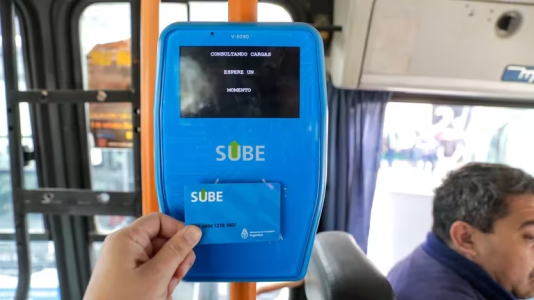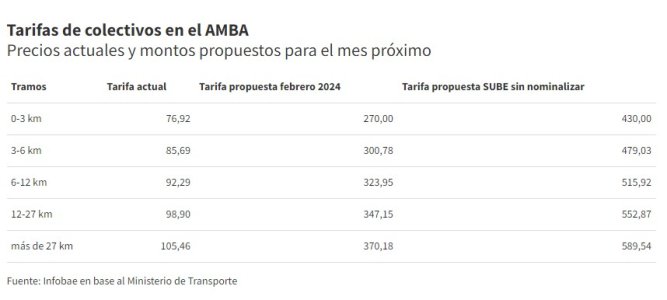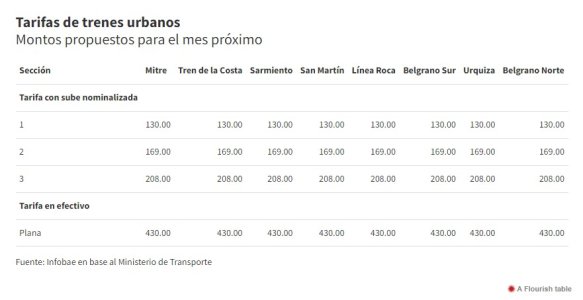AlexHund
New member
Increases of up to 250 percent: what prices did the Government propose for train and bus tickets in February - Infobae

Source:

 www.infobae.com
www.infobae.com
January 19, 2024
Through a resolution, the Ministry of Transportation called a public hearing to apply another increase after the 45% it set in January

The Government called a public hearing for the increase in transportation in February (Ministry of Transportation)
The Government called a public hearing, an obligatory prior step for a fare increase, at the same time that it proposed new prices for tickets of trains and buses urban trains that start at $130 for the former and $270 for the latter. It did so through resolution 1/2024 of the Transportation Secretariat of the Ministry of Infrastructure, published today in the Official Gazette.
The rates proposed by the Government are maximum objectives, which have to go through the filter of public consultation before being applied, but In principle, they represent an increase of just over 251% for tickets, which would be added to the 45% increase that was already applied in January.

If the proposed increase is fully applied, the minimum ticket will rise from the current $76.92 to $270 and will be used to travel up to three kilometers. The next fare (from three to six kilometers, the most used by AMBA passengers) will increase from $85.96 to $300.78, and the next, from six to twelve kilometers, will reach $323.95 from the current $92.29. The two most expensive (from 12 to 27 kilometers and more than 27) will have a value of 347 to 370 pesos, respectively.
A novelty is that there will be a different price, almost 60% more expensive, for those who use unnominated SUBE cards, that is, who use that of a third party or who have not registered theirs in their name. For these cases, the proposed rate starts at $430 for the shortest section and reaches $589.54 for the longest.
The differentiation between nominated and non-nominated SUBE cards seems to be an effort by the Government to identify who is using the card, in line with the stated objective of eliminating generalized transportation subsidies to supposedly privilege targeted subsidies. Subsidize not supply but demand.
In the case of the proposal of new rates for train tickets, the novelty is that they are standardized on the different lines. Until now, each line had its own rate schedule. That would be eliminated, if the prices proposed by Transport are applied.

On all AMBA lines, thus, the minimum ticket would cost $130 (on the Miter line, for example, today it costs $48.38), while section two would jump to $169 and the most expensive ticket $208. Taking the Miter line as a reference, the increase is around 170% compared to current values, although it varies depending on the starting point of each branch.
In the case of trains, the use of unnominated SUBE cards will imply paying double the fare. And the fines for evading payment of the ticket will be 10 times the maximum fare, that is, $2,080 in total. Also the social rate will be maintained, which pays 45% of the price.
On all AMBA lines, thus, the minimum ticket would cost $130 (on the Miter line, for example, today it costs $48.38), while section two would jump to $169 and the most expensive ticket $208. Taking the Miter line as a reference, the increase is around 170% compared to current values, although it varies depending on the starting point of each branch.
In the case of trains, the use of unnominated SUBE cards will imply paying double the fare. And the fines for evading payment of the ticket will be 10 times the maximum fare, that is, $2,080 in total. Also the social rate will be maintained, which pays 45% of the price.
 drive.google.com
drive.google.com
The previous national administration decided, at the time, to establish a tariff schedule that began in March 2023, after two and a half years of freezing, with monthly increases, based on the Consumer Price Index (CPI) of the Greater Region. Buenos Aires.
In the middle of the electoral contest, rates were frozen again until the modification imposed by the new government. The monthly increase mechanism will cover all urban and suburban bus services under national jurisdiction; as well as the metropolitan and regional train services of the Buenos Aires Metropolitan Area (AMBA), the Ministry of Infrastructure specified at the time.
The reestablishment of increases due to inflation seeks to “maintain the economic-financial equation that allows the maintenance of the public service of automobile and rail passenger transport involved, in conditions of quality and efficiency,” stated one of the paragraphs of the resolution's recitals. that determined the new tariff scheme.
Bus

Source:

Aumentos de hasta el 250 por ciento: qué precios propuso el Gobierno para los boletos de trenes y colectivos en febrero
A través de una resolución la Secretaría de Transporte llamó a audiencia pública para aplicar otra suba tras el 45% que fijó en enero
January 19, 2024
Through a resolution, the Ministry of Transportation called a public hearing to apply another increase after the 45% it set in January

The Government called a public hearing for the increase in transportation in February (Ministry of Transportation)
The Government called a public hearing, an obligatory prior step for a fare increase, at the same time that it proposed new prices for tickets of trains and buses urban trains that start at $130 for the former and $270 for the latter. It did so through resolution 1/2024 of the Transportation Secretariat of the Ministry of Infrastructure, published today in the Official Gazette.
The rates proposed by the Government are maximum objectives, which have to go through the filter of public consultation before being applied, but In principle, they represent an increase of just over 251% for tickets, which would be added to the 45% increase that was already applied in January.

If the proposed increase is fully applied, the minimum ticket will rise from the current $76.92 to $270 and will be used to travel up to three kilometers. The next fare (from three to six kilometers, the most used by AMBA passengers) will increase from $85.96 to $300.78, and the next, from six to twelve kilometers, will reach $323.95 from the current $92.29. The two most expensive (from 12 to 27 kilometers and more than 27) will have a value of 347 to 370 pesos, respectively.
A novelty is that there will be a different price, almost 60% more expensive, for those who use unnominated SUBE cards, that is, who use that of a third party or who have not registered theirs in their name. For these cases, the proposed rate starts at $430 for the shortest section and reaches $589.54 for the longest.
The differentiation between nominated and non-nominated SUBE cards seems to be an effort by the Government to identify who is using the card, in line with the stated objective of eliminating generalized transportation subsidies to supposedly privilege targeted subsidies. Subsidize not supply but demand.
In the case of the proposal of new rates for train tickets, the novelty is that they are standardized on the different lines. Until now, each line had its own rate schedule. That would be eliminated, if the prices proposed by Transport are applied.

On all AMBA lines, thus, the minimum ticket would cost $130 (on the Miter line, for example, today it costs $48.38), while section two would jump to $169 and the most expensive ticket $208. Taking the Miter line as a reference, the increase is around 170% compared to current values, although it varies depending on the starting point of each branch.
In the case of trains, the use of unnominated SUBE cards will imply paying double the fare. And the fines for evading payment of the ticket will be 10 times the maximum fare, that is, $2,080 in total. Also the social rate will be maintained, which pays 45% of the price.
On all AMBA lines, thus, the minimum ticket would cost $130 (on the Miter line, for example, today it costs $48.38), while section two would jump to $169 and the most expensive ticket $208. Taking the Miter line as a reference, the increase is around 170% compared to current values, although it varies depending on the starting point of each branch.
In the case of trains, the use of unnominated SUBE cards will imply paying double the fare. And the fines for evading payment of the ticket will be 10 times the maximum fare, that is, $2,080 in total. Also the social rate will be maintained, which pays 45% of the price.
anexo_7055546_1.pdf
 drive.google.com
drive.google.com
The previous national administration decided, at the time, to establish a tariff schedule that began in March 2023, after two and a half years of freezing, with monthly increases, based on the Consumer Price Index (CPI) of the Greater Region. Buenos Aires.
In the middle of the electoral contest, rates were frozen again until the modification imposed by the new government. The monthly increase mechanism will cover all urban and suburban bus services under national jurisdiction; as well as the metropolitan and regional train services of the Buenos Aires Metropolitan Area (AMBA), the Ministry of Infrastructure specified at the time.
The reestablishment of increases due to inflation seeks to “maintain the economic-financial equation that allows the maintenance of the public service of automobile and rail passenger transport involved, in conditions of quality and efficiency,” stated one of the paragraphs of the resolution's recitals. that determined the new tariff scheme.
What will be the prices of trains and buses in February?
If the official proposal were endorsed in the public consultation, transportation prices in the AMBA area would then be as follows.Bus
- 0-3 km $270.00
- 3-6 km $300.78
- 6-12 km $323.95
- 12-27 km $347.15
- more than 27 km $370.18
- Section 1 $130.00 with SUBE. Cash $430
- Section 2 $169.00 with SUBE. Cash $430
- Section 3 $208.00 with SUBE. Cash $430

